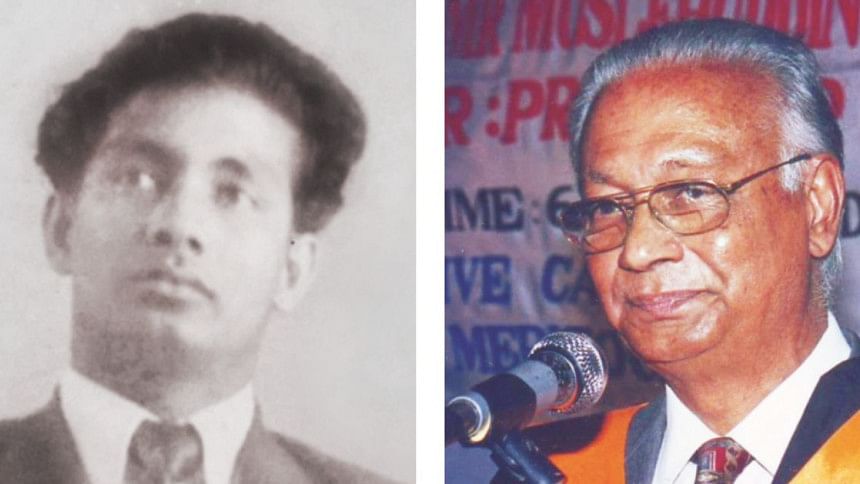Five moments, five lessons: A remembrance

Four years ago, my father, Janab Muslehuddin Ahmad, passed away. I still feel the pain of this loss. But, like many who have lost their parents, I find solace and consolation in memories. I wanted to share five such moments and the lessons learned from them. Although part of my reflection is personal, a large part is about public service, which is why I am sharing these moments.
1971/72
I was then studying in fourth grade in Paris. One day, as I headed out to school, my father asked if I would make something for him in my art class. He gave me a small sketch as a guide. With the help of my art teacher (and my mother) I built what my father requested. The next day my father gave a television interview. He had just defected from the Pakistan embassy and paid his allegiance to Bangladesh. And there behind him stood the first flag of Bangladesh ever to fly on French soil which I had made. Our little apartment became a safe haven for Bangladeshis in Europe, and eventually the first embassy of the new country. I learned in those months from my parents the importance of having an identity and fighting to preserve that identity. Because of my parents, I do not simply describe myself as a Bangladeshi — I am defined by my ethnicity and nationality.
1985/86
After my Masters in Public Policy at Harvard, I joined the Planning Commission in Dhaka to work on trade and industrial reforms. My father, then Ambassador to Romania, had just been posted as Secretary, Industries. The months that followed, we debated the importance of industrial reforms — I a 'free marketer' and my father, a seasoned administrator, who felt that development was better planned through careful regulation. I was always animated, focusing on technical analysis while my father explained patiently the difference between 'desirable and feasible' in public policy. One issue we discussed was the liberalisation of the investment regime in Bangladesh and the importance of eliminating the Ministry's control over private investment. My father introduced this important measure into the New Industrial Policy of Bangladesh well ahead of the demise of the 'licence Raj' in South Asia. Watching him, I learned about the importance of understanding the politics behind public policy and how to take forward a reform process from within the state structures. I learned to see through the 'eyes of the State' in order to undertake policy reform. This lesson is today at the core of my work.
1987/1990
Just before his retirement, my father spoke of using his government experience not as a private possession, but as an instrument to further serve the public. He focused on education for the younger generation. The idea of private universities became a part of our family discussions and from there emerged a strategy for building Bangladesh's first private university. Over the next few years my father built a coalition to introduce national legislation to enable the private sector in higher education and to establish the North South University (NSU), the first private university in Bangladesh. Working with him on NSU, I learned about the 'how to' of institution building. That institutions matter, I had learned in graduate school; the art of building institutions I learned from my father.
1997
During a visit to South Africa, my father met President Mandela. I was then working there with the World Bank. It was a memorable afternoon. The President was relaxing in his home with his grandchildren. He welcomed us with all the charm and magic that defined Madiba. For close to two hours, the discussion covered a range of topics from the freedom movement of Bangladesh and South Africa to the role constitutional lawyers from India played in South Africa's struggle. The discussion then settled on the political divides in Bangladesh and what it would take to bring about a common understanding between political parties around democracy and reconciliation. It was a conversation with many lessons. But, one message was clear: there could not be any substitute to democratic processes and that even a 'flawed democracy was superior to any model of governance for a nation — a message with deep implications for Bangladesh.
2012
On June 30th my father had a stroke. He was in the ICU, slowly recovering. But he was his usual self. He gave me a lecture about the Padma Bridge and complained that the World Bank — where I work — was infringing on the dignity and sovereignty of our nation. This was my father, ever worried about Bangladesh even after a stroke.
The following day my father had a second stroke and went into a coma. Two months later, he passed away. During this period my family and I found ourselves navigating through the opaque corridors of private hospitals in Dhaka. I found myself asking several questions. How do we know that the private hospitals are providing the right treatment? What protocols do they follow? Who holds them accountable? And how are the rights of patients and their families protected?
Interestingly, my father had been asking similar questions about private universities: How to assure the quality of private universities and ensure their accountability to parents? His proposed solution was to introduce a system of peer regulation, whereby private universities would jointly agree on a set of standards and establish a common process for evaluating their own performance through peer oversight. Compared to top down regulation, it places the accountability and responsibility of regulation on the universities themselves through a mutual agreement. The proposal of peer regulation for private universities may also be applicable to private hospitals.
In the months I saw my father in a coma, I realised we needed an open debate about private hospitals in Bangladesh and the type of regulatory framework that would be appropriate to ensure their quality and accountability to patients and their families. Ultimately, whether it was a private organisation, NGO or a State agency, ensuring its accountability was essential to protect consumers and citizens. This was my father's last message to me. Even in his final moments, he continued to teach me about public service. Thank you, Abba.
The writer, an economist, wrote this piece in remembrance of his father, Mr. Muslehuddin Ahmad, founder of North South University.

 For all latest news, follow The Daily Star's Google News channel.
For all latest news, follow The Daily Star's Google News channel. 



Comments